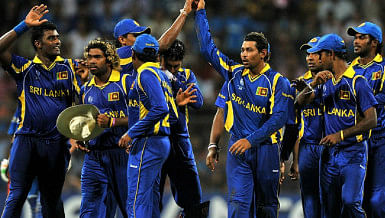Rubel Hossain is known for blowing hot and cold in a career spanning over a decade. Prone to err in the death overs, the right-arm pacer with a slinging action perhaps bowled his best ten overs in the one-day international against India in the Asia Cup final on Friday. His figures of 10-2-26-2 was a demonstration of how well he bowled in Dubai. He had Ravindra Jadeja caught in the 48th over, which was his last over, to create that window for a late twist in a pulsating final that Bangladesh lost off the last ball of the game.

Related Topics
Related News
If there is one thing that permeates every facet of Mushfiqur Rahim's identity as a cricketer and, as proved once again in the Asia Cup opener on Saturday, his status as Bangladesh's best all-round batsman it is his monk-like dedication to prepare as well as humanly possible.
He drew on the Zen-like calm that exhaustive levels of honing inevitably brings while authoring a sublime 150-ball 144 that started in 40-plus degree Celsius heat and went through the travails of a misfiring batting line-up. While a top order collapse and a middle order flurry of wickets is part and parcel of Bangladesh cricket, the Dubai heat in September is not something that any of the team had experienced.
"This is why we train. We don't have experience of batting in such conditions in the past but nobody really notices the hard work we put in at training," Mushfiqur said yesterday at the team's Dubai hotel. "We don't see you when we go for the running sessions at 8:00am. You come after 10:00am or 11:00am. The whole team dedicates itself to such training and this is the just result. [Mohammad] Mithun could have played such an innings because he too prepares himself really well."
He scored his first 10 runs off 31 deliveries, making sure there were no further damages after Bangladesh lost two wickets in the first over and Tamim Iqbal through injury in the second, talking Mohammad Mithun -- making a comeback to the side -- through the tough phase and some false shots. He hit the side's first boundary in the last ball of the eighth over, which in these boundary-filled times shows how tough those first 10 overs were.
Having shown his skill of endurance, the multi-layered Mushfiqur then set about taking the attack apart, bringing up his 50 off 67 balls.
"Mithun really helped me with his positive intent, he made things easier for me. I thought if we could build a partnership -- it was a very good batting wicket -- we would be back on track," said Mushfiqur. "But he got out at a bad time because a set batsman should not have gotten out at that time."
Mithun faltered in the 26th over, playing across the line to Malinga and getting out, precipitating a collapse of three wickets for 10 runs. Mushfiqur returned to endurance mode and continued to inch Bangladesh towards a competitive total with a string of small partnerships with the lower order.
When Tamim made his heroic appearance on 229 for nine, when all 13 players on the ground had thought the innings over, Mushfiqur went up a gear that probably he alone has in Bangladesh. At his best, his arsenal of shots is so varied that no delivery, even yorkers, escape punishment. There was the scoop that turned into a ramp at the last second, inside-out cover drives for a four and a six and a pulled six that would have been expected of a batsman twice his size.
It speaks to the scale of his ambition and his ability that, while the rest of the world raves about the innings, Mushfiqur would not say that it was his best innings.
"All things considered, many may say that," Mushfiqur said. "But I think in the future there may be better innings. But till now, it is one of the best; not the best."
About Tamim coming out to bat with a broken wrist, Mushfiqur -- nursing an injured rib himself -- said: "It was unbelievable. It was different from mine because he could not grip the bat at all. All of us have the dedication for the team and country. Of course the focus is on the two of us because the team won because of us, but even when we lose the dedication is the same."
There has been a lot of debate on social media and elsewhere regarding Liton Das's stumping by Mahendra Singh Dhoni in Friday's Asia Cup final. The decision was very close, as multiple angles of the sequence showed, before the third umpire finally ruled in favour of India. Here is what Bangladesh captain Mashrafe Bin Mortaza had to say about this: "It is hard to tell. At one point we felt it was not out. I think the third umpire can say it better. Maybe it will be discussed later."
After an agonising defeat in the final of the Asia Cup against India in UAE on Friday night, the Bangladesh cricket team returned home last night with heads held high.
Mashrafe Bin Mortaza and his troops fought till the last ball of the match defending a small total of 222, but ended up as runners-up once again.
It was a mixed bag for the Tigers in terms of performance and there were a lot of incidents on and off the field, making the competition a memorable one.
It started with Tamim Iqbal's return to bat with a finger injury and defending a Suranga Lakmal delivery against Sri Lanka in the opening game where the left-hander left the field early after suffering a blow to his left hand knuckle against the same bowler. Tamim's bravery was praised worldwide.
Mushfiqur Rahim smashed a magnificent hundred with a fractured rib in the same game before scoring 99 against Pakistan while Shakib Al Hasan's departure from the tournament following a finger injury ahead of the Pakistan game made matters more desperate for the Tigers.
Tigers' next assignment will be the upcoming home series against Zimbabwe later this month featuring three ODIs and two Test matches.
The Zimbabwe series will be followed by another home series against West Indies in November where they will play two Tests, three ODIs and three T20Is.
"We have two home series and the New Zealand tour. We have a lot of work to do in the next two series, where we will have to play well," Mashrafe told reporters after the defeat in the final on Friday.
The team management will also have to deal with the injury concerns of the senior members of the side ahead of the home series.
Sarfraz Ahmed, the Pakistan captain, took the blame for his team's poor show at the Asia Cup, but said that there's time to rebuild the team for the ICC Cricket World Cup 2019.
A convincing eight-wicket win over Hong Kong in the tournament opener suggested Pakistan were going to be a force. But it was followed by an eight-wicket defeat to India, and then, following a last-over win over Afghanistan in the Super Fours, losses to India and Bangladesh. As a result, Pakistan crashed out of the tournament they have won twice in the past.
"Yes, our performance was very poor. Our batting wasn't good, and we dropped a lot of catches. Our bowling was also patchy, and that's the reason we are out of the tournament," accepted Ahmed, who had a poor run with the bat himself, scoring 68 runs in four innings.
"I still believe we have a lot of talented players in the team. Look at Fakhar Zaman. Though he didn't have a good tournament, we have to back him. Babar Azam too. Imam has, thankfully, done well, but there's also Shadab and Hasan. We have to back them and take them along with us. We have to look at our bench too. We have a pool of players, and by the time the World Cup comes, we'll have a good team," said Ahmed.
"The World Cup is quite some time away, we have other engagements before that. Australia are coming, and then there's New Zealand. So we have to review our performance and see where we are falling short.
"We are losing too many wickets early, and the middle order has had to deal with the new ball, which isn't easy, and hitting quickly in the end isn't easy on these pitches. We'll have to get together and fix these issues."
While Ahmed called the performance 'alarming', he added, "There's no need to press the panic button. Yes, we have made mistakes as a team, and as a captain, I know that I didn't do well. But no need to panic, we need to back the players, look at the positions and see if there are people outside the team who can come in."
Liton Das has been one of the more maligned junior national cricketers in Bangladesh, because the perception is that he was wasting his considerable talent with the bat. To watch him play a cover drive and to witness that extra fraction of a second that he has to play the ball is to realise that he could grow to be one of the better batsmen produced by the country. However, seeing him throw away countless good starts with bad shots tempered those expectations considerably.
In the just-concluded Asia Cup, he took up the poisoned chalice of being Tamim Iqbal's opening partner -- a position that no one has been able to make his own despite being given enough opportunities. He scored a 42-ball 43 against Afghanistan in their Super Four game on Sunday, but as seemed typical then, he squandered the start with a wild slog sweep.
In Friday's final against India, Liton moved past all of that with a 117-ball 121 and showed why he has been persisted with. He also proved that, when it comes to possible candidates for the position of Tamim's opening partner, he is the first among equals. If he does make the transition, the innings provided a glimpse into how devastating an opening pair of Tamim and Liton could be.
India's pace attack is a formidable one, and the fiery Jasprit Bumrah had been allowed to settle into his rhythm thus far in the tournament. Liton however displayed that quality that is the bedrock of all batsmen for whom aggression is the modus operandi -- he backed himself to go after the opposition's most feared bowler.
Bumrah bowls above 140 kmph, but Liton repeatedly stepped out to him and hammered boundaries. Bumrah ended his third over, after Liton advanced down the wicket and hit the fast bowler off mid on, having conceded 23 runs. That put the pressure on India's spinners who had thus far come on and benefited from the pacers' economy in their opening spells. Liton took care of that, hitting leg-spinner Yuzvendra Chahal for big sixes, choosing his areas carefully.
But there was then the typical moment of madness when, just having completed his 50 off 33 deliveries, he went for a wild slog sweep off Kuldeep Yadav. This time, however, he survived as Chahal dropped the catch at mid on.
But what happened then was what will give fans the most hope. Liton saw skipper Mashrafe Bin Mortaza's chest thump from the dressing room asking him to stay strong, and the youngster responded. He chose to play mostly along the ground, picking areas shrewdly for his boundaries. As wickets started falling at regular intervals at the other end, Liton did not throw it away but actually slowed down to complete his maiden century off 87 balls. He kept batting responsibly before a marginal stumping decision, off a defensive shot, ended arguably the innings of the tournament.
It is early days yet, but if Liton can keep mixing his penchant for dominance with thoughtful batting, it will be an auspicious development for Bangladesh cricket.
 For all latest news, follow The Daily Star's Google News channel.
For all latest news, follow The Daily Star's Google News channel. 









Leave your comments